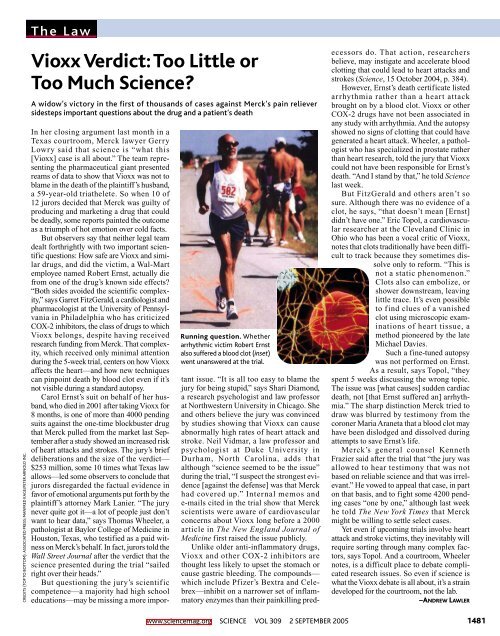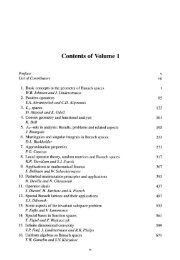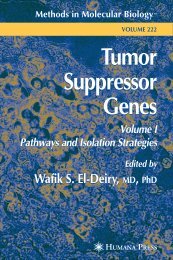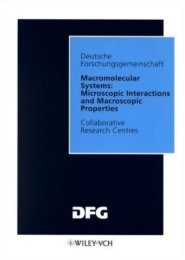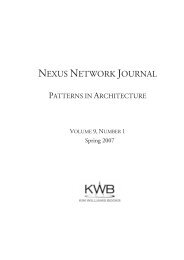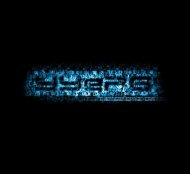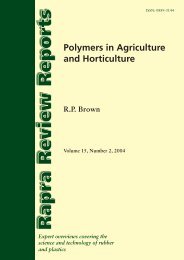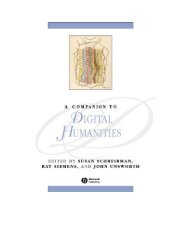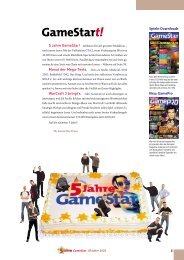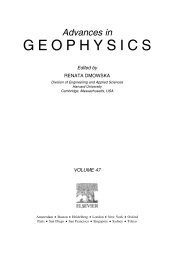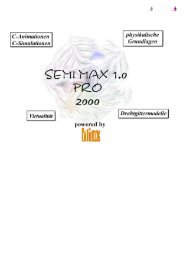THIS WEEK IN
THIS WEEK IN
THIS WEEK IN
Create successful ePaper yourself
Turn your PDF publications into a flip-book with our unique Google optimized e-Paper software.
CREDITS (TOP TO BOTTOM): ASSOCIATED PRESS; MANFRED KAGE/PETER ARNOLD <strong>IN</strong>C.<br />
The Law<br />
Vioxx Verdict:Too Little or<br />
Too Much Science?<br />
A widow’s victory in the first of thousands of cases against Merck’s pain reliever<br />
sidesteps important questions about the drug and a patient’s death<br />
Running question. Whether<br />
arrhythmic victim Robert Ernst<br />
also suffered a blood clot (inset)<br />
went unanswered at the trial.<br />
In her closing argument last month in a<br />
Texas courtroom, Merck lawyer Gerry<br />
Lowry said that science is “what this<br />
[Vioxx] case is all about.” The team representing<br />
the pharmaceutical giant presented<br />
reams of data to show that Vioxx was not to<br />
blame in the death of the plaintiff’s husband,<br />
a 59-year-old triathelete. So when 10 of<br />
12 jurors decided that Merck was guilty of<br />
producing and marketing a drug that could<br />
be deadly, some reports painted the outcome<br />
as a triumph of hot emotion over cold facts.<br />
But observers say that neither legal team<br />
dealt forthrightly with two important scientific<br />
questions: How safe are Vioxx and similar<br />
drugs, and did the victim, a Wal-Mart<br />
employee named Robert Ernst, actually die<br />
from one of the drug’s known side effects?<br />
“Both sides avoided the scientific complexity,”<br />
says Garret FitzGerald, a cardiologist and<br />
pharmacologist at the University of Pennsylvania<br />
in Philadelphia who has criticized<br />
COX-2 inhibitors, the class of drugs to which<br />
Vioxx belongs, despite having received<br />
research funding from Merck. That complexity,<br />
which received only minimal attention<br />
during the 5-week trial, centers on how Vioxx<br />
affects the heart—and how new techniques<br />
can pinpoint death by blood clot even if it’s<br />
not visible during a standard autopsy.<br />
Carol Ernst’s suit on behalf of her husband,<br />
who died in 2001 after taking Vioxx for<br />
8 months, is one of more than 4000 pending<br />
suits against the one-time blockbuster drug<br />
that Merck pulled from the market last September<br />
after a study showed an increased risk<br />
of heart attacks and strokes. The jury’s brief<br />
deliberations and the size of the verdict—<br />
$253 million, some 10 times what Texas law<br />
allows—led some observers to conclude that<br />
jurors disregarded the factual evidence in<br />
favor of emotional arguments put forth by the<br />
plaintiff’s attorney Mark Lanier. “The jury<br />
never quite got it—a lot of people just don’t<br />
want to hear data,” says Thomas Wheeler, a<br />
pathologist at Baylor College of Medicine in<br />
Houston, Texas, who testified as a paid witness<br />
on Merck’s behalf. In fact, jurors told the<br />
Wall Street Journal after the verdict that the<br />
science presented during the trial “sailed<br />
right over their heads.”<br />
But questioning the jury’s scientific<br />
competence—a majority had high school<br />
educations—may be missing a more important<br />
issue. “It is all too easy to blame the<br />
jury for being stupid,” says Shari Diamond,<br />
a research psychologist and law professor<br />
at Northwestern University in Chicago. She<br />
and others believe the jury was convinced<br />
by studies showing that Vioxx can cause<br />
abnormally high rates of heart attack and<br />
stroke. Neil Vidmar, a law professor and<br />
psychologist at Duke University in<br />
Durham, North Carolina, adds that<br />
although “science seemed to be the issue”<br />
during the trial, “I suspect the strongest evidence<br />
[against the defense] was that Merck<br />
had covered up.” Internal memos and<br />
e-mails cited in the trial show that Merck<br />
scientists were aware of cardiovascular<br />
concerns about Vioxx long before a 2000<br />
article in The New England Journal of<br />
Medicine first raised the issue publicly.<br />
Unlike older anti-inflammatory drugs,<br />
Vioxx and other COX-2 inhibitors are<br />
thought less likely to upset the stomach or<br />
cause gastric bleeding. The compounds—<br />
which include Pfizer’s Bextra and Celebrex—inhibit<br />
on a narrower set of inflammatory<br />
enzymes than their painkilling predecessors<br />
do. That action, researchers<br />
believe, may instigate and accelerate blood<br />
clotting that could lead to heart attacks and<br />
strokes (Science, 15 October 2004, p. 384).<br />
However, Ernst’s death certificate listed<br />
arrhythmia rather than a heart attack<br />
brought on by a blood clot. Vioxx or other<br />
COX-2 drugs have not been associated in<br />
any study with arrhythmia. And the autopsy<br />
showed no signs of clotting that could have<br />
generated a heart attack. Wheeler, a pathologist<br />
who has specialized in prostate rather<br />
than heart research, told the jury that Vioxx<br />
could not have been responsible for Ernst’s<br />
death. “And I stand by that,” he told Science<br />
last week.<br />
But FitzGerald and others aren’t so<br />
sure. Although there was no evidence of a<br />
clot, he says, “that doesn’t mean [Ernst]<br />
didn’t have one.” Eric Topol, a cardiovascular<br />
researcher at the Cleveland Clinic in<br />
Ohio who has been a vocal critic of Vioxx,<br />
notes that clots traditionally have been difficult<br />
to track because they sometimes dissolve<br />
only to reform. “This is<br />
not a static phenomenon.”<br />
Clots also can embolize, or<br />
shower downstream, leaving<br />
little trace. It’s even possible<br />
to find clues of a vanished<br />
clot using microscopic examinations<br />
of heart tissue, a<br />
method pioneered by the late<br />
Michael Davies.<br />
Such a fine-tuned autopsy<br />
was not performed on Ernst.<br />
As a result, says Topol, “they<br />
spent 5 weeks discussing the wrong topic.<br />
The issue was [what causes] sudden cardiac<br />
death, not [that Ernst suffered an] arrhythmia.”<br />
The sharp distinction Merck tried to<br />
draw was blurred by testimony from the<br />
coroner Maria Araneta that a blood clot may<br />
have been dislodged and dissolved during<br />
attempts to save Ernst’s life.<br />
Merck’s general counsel Kenneth<br />
Frazier said after the trial that “the jury was<br />
allowed to hear testimony that was not<br />
based on reliable science and that was irrelevant.”<br />
He vowed to appeal that case, in part<br />
on that basis, and to fight some 4200 pending<br />
cases “one by one,” although last week<br />
he told The New York Times that Merck<br />
might be willing to settle select cases.<br />
Yet even if upcoming trials involve heart<br />
attack and stroke victims, they inevitably will<br />
require sorting through many complex factors,<br />
says Topol. And a courtroom, Wheeler<br />
notes, is a difficult place to debate complicated<br />
research issues. So even if science is<br />
what the Vioxx debate is all about, it’s a strain<br />
developed for the courtroom, not the lab.<br />
–ANDREW LAWLER<br />
www.sciencemag.org SCIENCE VOL 309 2 SEPTEMBER 2005 1481


